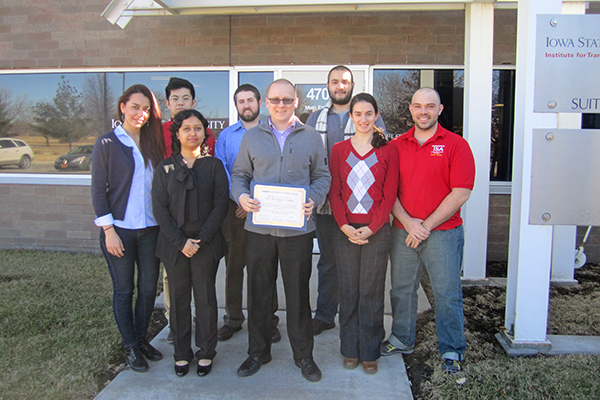
A team of students from the Department of Civil, Construction and Environmental Engineering (CCEE) at Iowa State University recently received a best paper award through the 2015 Transportation Research Board (TRB) Data Contest. The award was presented at the 2015 TRB Annual Meeting, held Jan. 11-15 in Washington, D.C.
The Iowa State team comprised seven transportation engineering graduate students, who worked under the direction of Associate Professor Peter Savolainen. These students included: Timothy Barrette, Georges Bou-Saab, Amrita Goswamy, Raha Hamzeie, Emira Rista, Brendan Russo and Bo Wang. The team received the best paper award for their work in developing a random parameters negative binomial (RPNB) model. This model accommodated several important analytical concerns that are common to police-reported crash data, including temporal and spatial correlation. As compared to 12-foot lanes, the team’s results showed that rear-end and sideswipe crashes increased by 11 percent when lane widths were reduced to 11 feet. More pronounced increases of 22 percent (rear-end collisions) and 41 percent (sideswipe collisions) were observed when lanes were 10 feet wide.
The purpose of this contest, which currently is in its third year, is to provide a platform for researchers, practitioners and students to learn about cutting-edge statistical methods employed in the transportation field.
The objective of the 2015 competition was to develop an exploratory, analytical or statistical model to assess the impacts of narrow lane width on the safety of high-capacity urban roads. Contest participants were provided with 10 years of crash data from nearly 1,000 road segments in the state of Nebraska. The dataset also included information on traffic volumes, speed limits, lane widths, and other geometric characteristics.
Several TRB committees sponsored the data contest: Artificial Intelligence and Advanced Computing (ABJ70), Statistical Methods (ABJ80), Urban Transportation Data and Information Systems (ABJ30), National Transportation Data Requirements and Programs (ABJ10), Transportation Demand Forecasting (ADB40) and Traveler Behavior and Values (ADB10).
Read more about transportation engineering graduate student research at Iowa State University.